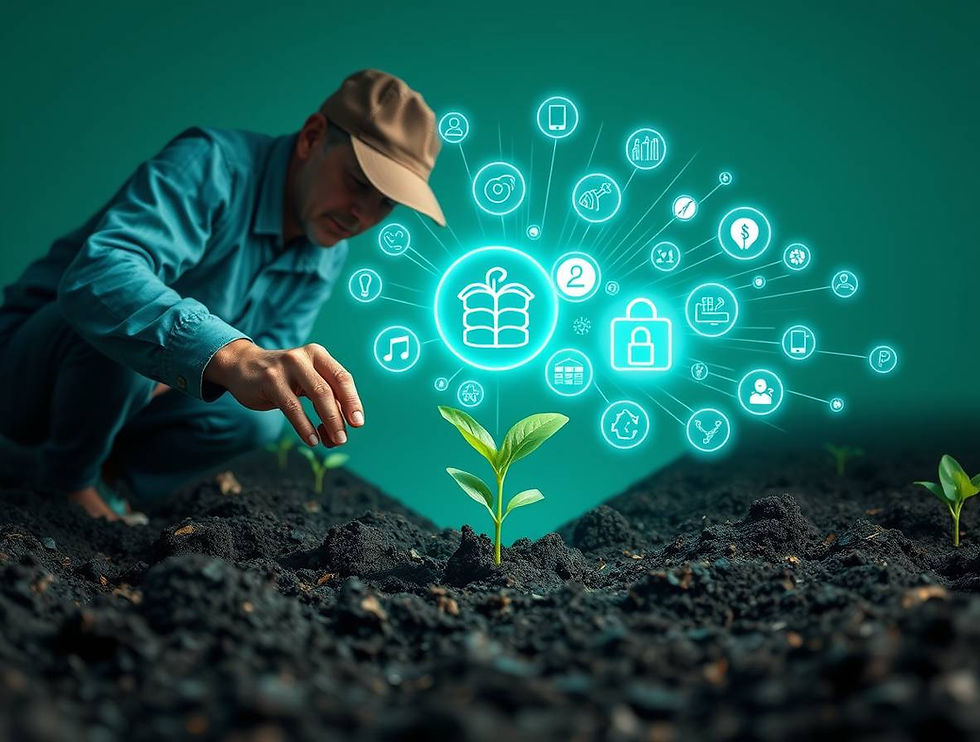Blockchain for Transparency and Traceability in Agriculture
- CYOL Press Release

- Sep 18, 2025
- 4 min read
By CYOL Staff
In today’s global food system, consumers are increasingly concerned about where their food comes from, how it is produced, and whether it is safe and sustainable. At the same time, producers, exporters, and retailers are under pressure to provide trustworthy information to meet growing demand for transparency. Food safety scandals, fraudulent labeling, and unsustainable farming practices have all reduced public trust in traditional supply chains. In this context, blockchain technology is emerging as a powerful tool to transform agriculture. While it is often associated with cryptocurrency, blockchain is now being used to enhance food traceability, improve supply chain transparency, and support sustainable practices across farming and food industries.

Understanding Blockchain in Simple Terms
Blockchain is best understood as a digital record book that is shared across a network. Unlike traditional records, once information is entered into the blockchain, it cannot be changed or erased. Every transaction, such as harvesting crops, packaging products, transporting goods, or selling food in the market, is stored in this digital record permanently. Because the system is decentralized and transparent, every participant in the chain, from farmers to retailers, can view the same trusted information. This ability to create tamper proof records is what makes blockchain so powerful in agriculture, where trust and accountability are essential.
Food Traceability and Consumer Trust
One of the major advantages of blockchain in agriculture is its ability to improve food traceability. Food safety crises, such as contaminated vegetables or unsafe meat, can cause panic among consumers and heavy losses for producers. Traditionally, tracing the origin of a contaminated product could take days or even weeks, during which time more people may fall ill, and companies may lose millions. Blockchain speeds up this process dramatically. By recording each step of food production from planting seeds to delivering the final product to the supermarket, blockchain allows every actor in the chain to know exactly where the food came from and how it was handled. For consumers, this builds confidence. Many systems allow shoppers to scan a QR code on food packaging and instantly see details about the farm, the methods used, and the journey of the product. For example, Walmart’s pilot blockchain system for leafy greens reduced the time needed to trace the source of contamination from seven days to just over two seconds, proving the enormous value of blockchain in protecting consumer health.

Supply Chain Transparency and Fair Practices
Agricultural supply chains are often long and complex, involving farmers, traders, processors, exporters, logistics companies, and retailers. This complexity creates opportunities for fraud, delays, and information gaps. For example, some products are falsely labeled as “organic” or “fair trade” when they are not, which misleads consumers and harms honest producers. Blockchain can solve this problem by recording every step in the journey of food products in real time. Since data cannot be altered once it is entered, there is less chance of false claims or manipulation. This ensures that all stakeholders have access to accurate and verified information. Moreover, blockchain can help small farmers gain fairer prices for their produce. By proving the quality and origin of their crops through blockchain records, they can negotiate better deals with buyers and avoid exploitation by middlemen. Overall, blockchain builds transparency across the entire chain, creating a more efficient and trustworthy system.
Supporting Sustainability Goals
Sustainability has become a global priority, and agriculture plays a central role in achieving it. Blockchain supports sustainable practices by making it easier to verify environmental and ethical claims. For instance, products labeled as organic or fair trade can be tracked and verified on the blockchain, reducing the risk of greenwashing and false marketing. Retailers and consumers can see proof of certifications directly, which encourages producers to follow sustainable standards more strictly. In addition, blockchain helps reduce waste in the food system. With accurate tracking of products, spoilage and unnecessary losses can be minimized because producers and retailers know exactly where goods are, how long they have been stored, and when they should be delivered. Blockchain also creates accountability. When every step of the process is recorded, companies are less likely to engage in unsustainable or unethical practices because they know their actions are visible. This creates a culture of responsibility that supports global sustainability goals.
Challenges in Adoption
Despite its benefits, blockchain in agriculture still faces challenges. The initial cost of setting up blockchain systems can be high, especially for small scale farmers who may not have the resources to adopt new technology. Training and digital literacy are also important issues. Many farmers, particularly in developing countries, may not be familiar with digital tools, and they will need support to use blockchain effectively. There are also technical challenges, such as integrating blockchain systems with existing supply chain management tools and ensuring data accuracy when entering records. If incorrect data is entered into the blockchain, the system will record it permanently, so accuracy at the point of entry is crucial. These challenges must be addressed through affordable solutions, capacity building programs, and collaboration between governments, businesses, and technology providers.

Blockchain technology has the potential to revolutionize agriculture by creating systems that are more transparent, traceable, and sustainable. It helps consumers trust the food they eat, enables producers to prove the quality of their products, and supports companies in meeting sustainability commitments. While challenges such as cost, training, and integration remain, the progress already made by global companies shows that blockchain is no longer just an idea; it is a practical tool with real world benefits. For the agriculture industry, blockchain is more than just a technological innovation; it is a pathway to building trust, safety, and sustainability in the global food system.
























Comments